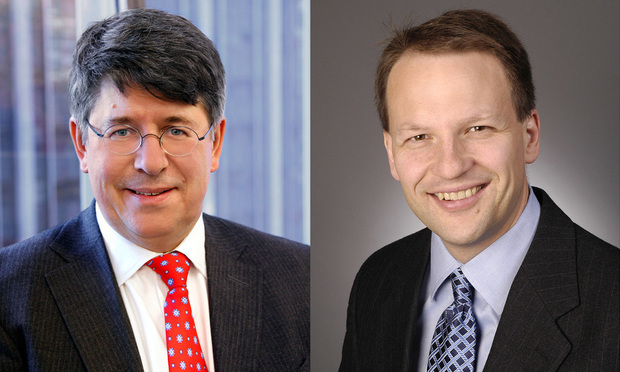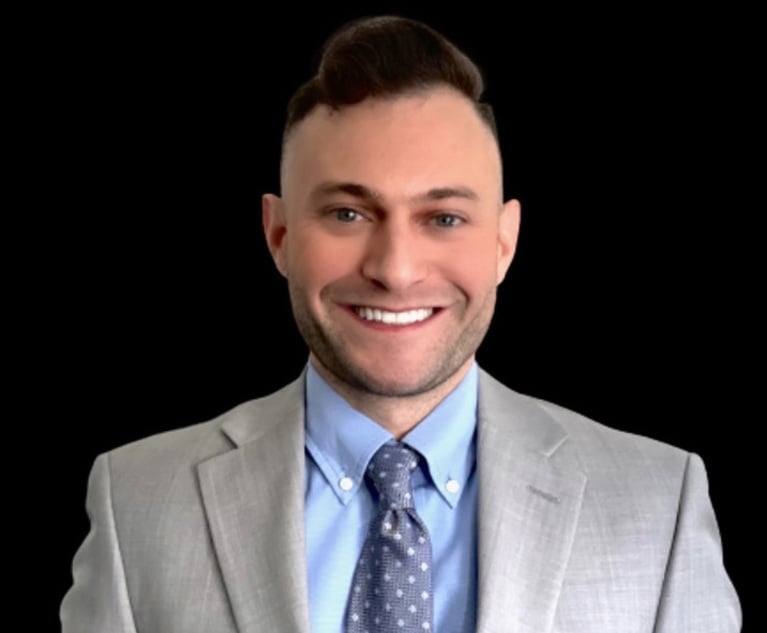Supreme Court Sets Stage for Patent Eligibility Cert Votes
The justices have scheduled six Section 101 cases for votes on Jan. 10. They include a medical diagnostics case that the solicitor general says the court should use to overhaul the law of patent eligibility. HP Inc. and Hikma Pharmaceuticals argue that their cases ought to at least go along for the ride.
December 27, 2019 at 05:36 PM
5 minute read
 (From left) Nicholas Groombridge of Paul, Weiss, Rifkind, Wharton & Garrison and Steffen Johnson of Winston & Strawn (courtesy photos)
(From left) Nicholas Groombridge of Paul, Weiss, Rifkind, Wharton & Garrison and Steffen Johnson of Winston & Strawn (courtesy photos)
Jan. 10 will be D-Day for patent eligibility at the U.S. Supreme Court—"D" as in Decision.
The court has scheduled certiorari votes on three cases addressing Section 101 of the Patent Act that were highlighted earlier this month by Solicitor General Noel Francisco's office. If the justices grant cert in any one—or, as a couple of petitioners are now suggesting, in two of the three—the court would be poised to rewrite or refine the most contentious area of patent law, or declare it settled once and for all.
"As the government's brief dramatically illustrates, there is a raging debate over the scope and wisdom of this Court's unanimous decision just seven years ago in Mayo Collaborative Services v. Prometheus Laboratories, Inc.," attorneys for Hikma Pharmaceuticals USA Inc. argue in a Dec. 20 response to the solicitor general's brief.
The solicitor general actually recommended against granting cert in Hikma v. Vanda and HP v. Berkheimer. But the solicitor general said the court should in the appropriate case revisit a series of four patent eligibility decisions it issued during the first half of the decade that have caused a sea change in patent prosecution and litigation. The solicitor general suggested doing so in the medical diagnostics case Athena Diagnostics v. Mayo Collaborative Services.
The court has set all three cases for votes at its Jan. 10 conference. It's also placed on the same conference three other eligibility cases that the court had seemed to put on hold ahead of the solicitor general's briefs.
Hikma and Berkheimer have drawn the most interest because the justices called for the views of the solicitor general in March and January of this year, respectively.
Hikma addresses the patentability of methods of treating disease, such as new dosing regimes for existing drugs. The U.S. Court of Appeals for the Federal Circuit ruled 2-1 that Vanda's patent on a method of treating schizophrenia, determining a patient's particular genotype and adjusting dosage of iloperidone accordingly, is eligible for patenting.
Hikma, based in Eatontown, New Jersey, argues that the Supreme Court ruled in its 2012 Mayo decision that mere methods of applying natural laws are not eligible for patent protection. The court subsequently reaffirmed its two-step framework for determining patent eligibility—by a unanimous vote—in 2014′s Alice v. CLS Bank decision, Hikma notes.
Hikma continues to be represented by Winston & Strawn. Previous counsel of record Steffen Johnson has joined Wilson Sonsini Goodrich & Rosati's Washington, D.C., office, which has been added to Hikma's team (along with Wilson of counsel Michael McConnell in Palo Alto, California, whose judicial service on the U.S. Court of Appeals for the Tenth Circuit overlapped with Justice Neil Gorsuch's). Washington Winston partner Charles Klein is now counsel of record.
Vanda Pharmaceuticals Inc., whose headquarters are based in Washington, D.C., responded Dec. 26. The company said it agrees with the solicitor general that patent eligibility is a knottier problem for medical diagnostics than it is for methods of treatment. "The Court has already indicated in Mayo that Section 101 encompasses claims directed to 'a new way of using an existing drug,'" Vanda argues.
Paul, Weiss, Rifkind, Wharton & Garrison in New York remains counsel of record for Vanda. Supreme Court litigator Kannon Shanmugam, who joined the firm's Washington, D.C., office in January, also appears on Vanda's brief now.
HP v. Berkheimer involves a computer-implemented invention. The question is whether the second step in the Supreme Court's patent eligibility framework—determining whether a skilled artisan would have considered claimed processes routine and conventional at the time of the patent—is a question of law or fact. The Federal Circuit held the latter in 2018, making it more difficult for accused infringers to get patent suits dismissed early on the pleadings.
Attorneys for Palo Alto, California-based HP Inc. contend that the solicitor general has now conceded that eligibility is a question of law. "The government offers no defense of the decision below and concedes that the 'substantial uncertainty' the decision caused has had 'considerable practical consequences,'" HP argues.
HP is represented by Morgan, Lewis & Bockius and Gibson, Dunn & Crutcher. Morgan Lewis Washington partner David Salmons is counsel of record.
Both Hikma and HP are also gunning for review even if the court follows the solicitor general's recommendation and grants cert in Athena, the medical diagnostics case.
HP argues that Athena and Hikma are focused on step one of the Mayo/Alice framework: determining whether a claim is directed to an abstract idea, a law of nature or a natural phenomenon. Berkheimer addresses step two. "It would be manifestly better to pair this case with Athena so that the Court could consider the full spectrum of Section 101 litigation," HP argues.
Hikma argues that resolving Section 101′s application to diagnostics could leave lower courts in the dark about methods of treatment. "Unless the Court is certain that it unanimously erred in Mayo and Alice," says Hikma, "it makes little sense to review only Athena."
Vanda points out that it's not a foregone conclusion that Athena will be granted cert, noting that the solicitor general recommended granting review "in Athena or in another such case."
"The Court should deny the petition in this case without imposing needless and potentially substantial further delay in what is already a five-year-long litigation," Vanda argues.
This content has been archived. It is available through our partners, LexisNexis® and Bloomberg Law.
To view this content, please continue to their sites.
Not a Lexis Subscriber?
Subscribe Now
Not a Bloomberg Law Subscriber?
Subscribe Now
NOT FOR REPRINT
© 2025 ALM Global, LLC, All Rights Reserved. Request academic re-use from www.copyright.com. All other uses, submit a request to [email protected]. For more information visit Asset & Logo Licensing.
You Might Like
View All
'Religious Discrimination'?: 4th Circuit Revives Challenge to Employer Vaccine Mandate
2 minute read
'Pull Back the Curtain': Ex-NFL Players Seek Discovery in Lawsuit Over League's Disability Plan


Fatal Shooting of CEO Sets Off Scramble to Reassess Executive Security
5 minute readLaw Firms Mentioned
Trending Stories
- 1South Florida Attorney Charged With Aggravated Battery After Incident in Prime Rib Line
- 2'A Death Sentence for TikTok'?: Litigators and Experts Weigh Impact of Potential Ban on Creators and Data Privacy
- 3Bribery Case Against Former Lt. Gov. Brian Benjamin Is Dropped
- 4‘Extremely Disturbing’: AI Firms Face Class Action by ‘Taskers’ Exposed to Traumatic Content
- 5State Appeals Court Revives BraunHagey Lawsuit Alleging $4.2M Unlawful Wire to China
Who Got The Work
J. Brugh Lower of Gibbons has entered an appearance for industrial equipment supplier Devco Corporation in a pending trademark infringement lawsuit. The suit, accusing the defendant of selling knock-off Graco products, was filed Dec. 18 in New Jersey District Court by Rivkin Radler on behalf of Graco Inc. and Graco Minnesota. The case, assigned to U.S. District Judge Zahid N. Quraishi, is 3:24-cv-11294, Graco Inc. et al v. Devco Corporation.
Who Got The Work
Rebecca Maller-Stein and Kent A. Yalowitz of Arnold & Porter Kaye Scholer have entered their appearances for Hanaco Venture Capital and its executives, Lior Prosor and David Frankel, in a pending securities lawsuit. The action, filed on Dec. 24 in New York Southern District Court by Zell, Aron & Co. on behalf of Goldeneye Advisors, accuses the defendants of negligently and fraudulently managing the plaintiff's $1 million investment. The case, assigned to U.S. District Judge Vernon S. Broderick, is 1:24-cv-09918, Goldeneye Advisors, LLC v. Hanaco Venture Capital, Ltd. et al.
Who Got The Work
Attorneys from A&O Shearman has stepped in as defense counsel for Toronto-Dominion Bank and other defendants in a pending securities class action. The suit, filed Dec. 11 in New York Southern District Court by Bleichmar Fonti & Auld, accuses the defendants of concealing the bank's 'pervasive' deficiencies in regards to its compliance with the Bank Secrecy Act and the quality of its anti-money laundering controls. The case, assigned to U.S. District Judge Arun Subramanian, is 1:24-cv-09445, Gonzalez v. The Toronto-Dominion Bank et al.
Who Got The Work
Crown Castle International, a Pennsylvania company providing shared communications infrastructure, has turned to Luke D. Wolf of Gordon Rees Scully Mansukhani to fend off a pending breach-of-contract lawsuit. The court action, filed Nov. 25 in Michigan Eastern District Court by Hooper Hathaway PC on behalf of The Town Residences LLC, accuses Crown Castle of failing to transfer approximately $30,000 in utility payments from T-Mobile in breach of a roof-top lease and assignment agreement. The case, assigned to U.S. District Judge Susan K. Declercq, is 2:24-cv-13131, The Town Residences LLC v. T-Mobile US, Inc. et al.
Who Got The Work
Wilfred P. Coronato and Daniel M. Schwartz of McCarter & English have stepped in as defense counsel to Electrolux Home Products Inc. in a pending product liability lawsuit. The court action, filed Nov. 26 in New York Eastern District Court by Poulos Lopiccolo PC and Nagel Rice LLP on behalf of David Stern, alleges that the defendant's refrigerators’ drawers and shelving repeatedly break and fall apart within months after purchase. The case, assigned to U.S. District Judge Joan M. Azrack, is 2:24-cv-08204, Stern v. Electrolux Home Products, Inc.
Featured Firms
Law Offices of Gary Martin Hays & Associates, P.C.
(470) 294-1674
Law Offices of Mark E. Salomone
(857) 444-6468
Smith & Hassler
(713) 739-1250










